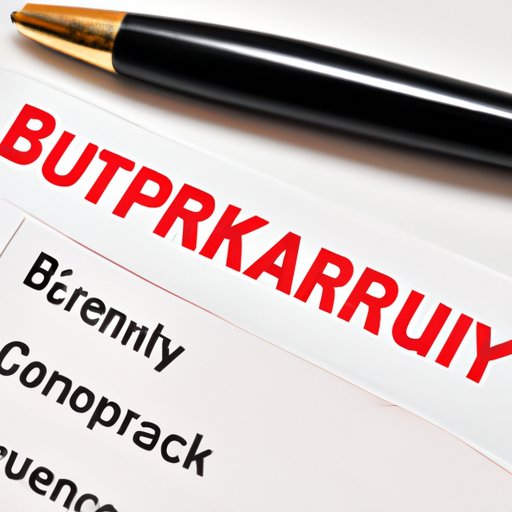
I. Introduction
When people find themselves in financial trouble, bankruptcy can be a useful tool to alleviate debt and get a fresh start. However, filing for bankruptcy is a major decision that can have long-lasting effects on your credit score and financial future. This article will provide a comprehensive guide to what happens when you file for bankruptcy, the consequences of filing, and alternatives to consider.
II. The Process of Filing for Bankruptcy: A Comprehensive Guide
There are three types of bankruptcy that individuals can file for: Chapter 7, Chapter 11, and Chapter 13. Chapter 7 bankruptcy is the most common type, which involves liquidating assets to pay off creditors. Chapter 11 and Chapter 13 bankruptcy involve reorganizing debt and setting up a payment plan.
To be eligible for bankruptcy, you must meet certain criteria, including having a minimum amount of debt and passing a means test that determines your ability to pay back creditors. The process of filing for bankruptcy involves completing a petition, attending a counseling session, and attending a meeting of creditors.
When filing for bankruptcy, you must provide extensive paperwork including income, assets, debts, and expenses. The role of the trustee is to oversee the bankruptcy process, including selling assets and distributing payments to creditors.
III. The Consequences of Filing for Bankruptcy: What to Expect
While bankruptcy can provide relief from overwhelming debt, it does come with consequences. Filing for bankruptcy will immediately affect your financial life, including freezing your bank accounts and putting a stop to creditor collections. Bankruptcy will negatively affect your credit score, making it difficult to obtain loans or credit in the future.
Bankruptcy can also affect your assets, with some being sold to pay off creditors. Additionally, filing for bankruptcy can cause stress on personal relationships, as it is often viewed as a last resort.
IV. Bankruptcy Myths Debunked: Separating Fact from Fiction
There are many myths surrounding bankruptcy that prevent people from taking advantage of this debt relief option. One common myth is that filing for bankruptcy means losing everything you own. In reality, bankruptcy exemptions protect certain assets, including your home and car, from being sold to pay off creditors.
Another myth is that filing for bankruptcy will permanently ruin your credit score. While bankruptcy will negatively affect your credit score, you can begin rebuilding your credit immediately after filing by paying bills on time and obtaining secured credit.
It is important to separate fact from fiction to fully understand the impacts of filing for bankruptcy and how to move forward effectively.
V. How to Rebuild Your Credit Score After Filing for Bankruptcy
Your credit score is an important factor in your financial life, determining your ability to obtain loans and credit. After filing for bankruptcy, rebuilding your credit score is a crucial step in moving forward. This can be done by paying bills on time, obtaining secured credit, monitoring credit reports for accuracy, and avoiding new debt.
It’s important to recognize that rebuilding your credit score after bankruptcy takes time, but it is possible with patience and persistence.
VI. Alternatives to Bankruptcy: Exploring Your Options
Before filing for bankruptcy, it’s important to explore alternative measures that can provide debt relief. One option is credit counseling, which involves working with a counselor to create a debt management plan. This plan can help you pay off debt through lower interest rates and manageable payments.
Another option is debt settlement, which involves negotiating with creditors to lower the amount owed. However, debt settlement can negatively affect credit score and is not guaranteed to work.
It’s important to explore and understand each alternative measure before deciding whether or not to file for bankruptcy.
VII. Conclusion
Bankruptcy can provide much-needed relief from overwhelming debt, but it’s important to understand the process, consequences, and alternatives before deciding to file. If you are considering bankruptcy, it’s important to act early on solutions before the problem gets worse and to seek the guidance of a qualified bankruptcy attorney.
Remember, filing for bankruptcy is a major decision with long-lasting effects, but with the right understanding and resources, it can be an incredibly effective tool for achieving financial stability and a fresh start.




